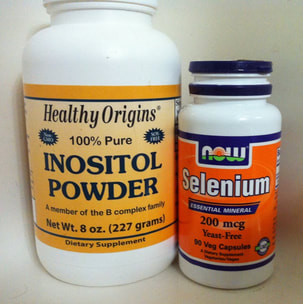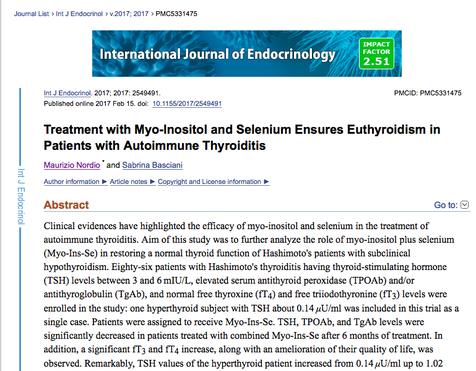
As my good friends know, I am always on the lookout for new science that may shed light on lifestyle options that may be helpful for preventing or reversing various common health issues-- and then sharing this information with those I think might have an interest in it. I had just been privately emailing a new study that I found, suggesting reversal of Hashimoto's Disease might be possible, to several friends when it occurred to me that with thyroid disease as prevalent as it is -- this one might be worth sharing on my blog and in my newsletter -- as thyroid disorders are becoming extremely common.
First a little background. Hypothyroidism is what results when the body has too little thyroid hormone, and is usually evidenced by an increase in the blood TSH levels. Hyperthyroidism is the result of too much thyroid hormone and is associated with depression or lowering of the TSH. Low thyroid or the "hypo" form is far more common and in the US is most often caused by an autoimmune disease called Hashimoto's Thyroiditis. Graves Disease is also an autoimmune thyroid disease, but it results in an overactive thyroid and too much thyroid hormone.
There has been evidence for some time, that both Hashimotos and Graves, may be triggered and even maintained by the consumption of gluten, in genetically susceptible people. There is also evidence that about 2/3 of Americans probably carry the genes to become gluten intolerant, that the incidence of gluten intolerance is increasing, and that many people who would benefit from a gluten-free diet, are negative by every single currently used diagnostic test for gluten intolerance and Celiac Disease.
However, it is likely that once enough damage has been done to the thyroid as a result of exposure to gluten, simply going gluten free may not be enough to enable the thyroid to function optimally again. However complete elimination of gluten would still be important, because there is evidence that the risk of developing additional autoimmune diseases, and other health problems increases over time with the continued exposure to gluten. If you want to learn more about science on this issue, the folks down in Jackson Mississippi recorded and posted a talk I gave there on this subject awhile back. Click on the image of me giving this talk below to watch that video.
First a little background. Hypothyroidism is what results when the body has too little thyroid hormone, and is usually evidenced by an increase in the blood TSH levels. Hyperthyroidism is the result of too much thyroid hormone and is associated with depression or lowering of the TSH. Low thyroid or the "hypo" form is far more common and in the US is most often caused by an autoimmune disease called Hashimoto's Thyroiditis. Graves Disease is also an autoimmune thyroid disease, but it results in an overactive thyroid and too much thyroid hormone.
There has been evidence for some time, that both Hashimotos and Graves, may be triggered and even maintained by the consumption of gluten, in genetically susceptible people. There is also evidence that about 2/3 of Americans probably carry the genes to become gluten intolerant, that the incidence of gluten intolerance is increasing, and that many people who would benefit from a gluten-free diet, are negative by every single currently used diagnostic test for gluten intolerance and Celiac Disease.
However, it is likely that once enough damage has been done to the thyroid as a result of exposure to gluten, simply going gluten free may not be enough to enable the thyroid to function optimally again. However complete elimination of gluten would still be important, because there is evidence that the risk of developing additional autoimmune diseases, and other health problems increases over time with the continued exposure to gluten. If you want to learn more about science on this issue, the folks down in Jackson Mississippi recorded and posted a talk I gave there on this subject awhile back. Click on the image of me giving this talk below to watch that video.
So now I'd like to share with you an interesting study that might suggest some additional possibilities for healing thyroid dysfunction. The study was published earlier this year in the International Journal of Endocrinology. Clicking on the image below will take you directly to the study, in case you would like to read it for yourself.
This study basically took people with diagnosed but very early Hashimoto's Disease (and one person with Graves Disease) and had them take Inositol and selenium for six months. They demonstrated significant normalization of TSH in this population, which translated into noticeable improvements in well-being.
If someone is already taking thyroid replacement for hypothyroidism and tries this protocol, they would probably want to carefully monitor thyroid function -- and taper medications as necessary, or else they could experience hyperthyroid symptoms and/or have the medication interfere with the body's attempts to heal and normalize the endocrine system. I will add, I am not a medical doctor, and am sharing this information for educational purposes only. If you are interested in trying this you should consult your appropriate health-care provider. : )
If someone is already taking thyroid replacement for hypothyroidism and tries this protocol, they would probably want to carefully monitor thyroid function -- and taper medications as necessary, or else they could experience hyperthyroid symptoms and/or have the medication interfere with the body's attempts to heal and normalize the endocrine system. I will add, I am not a medical doctor, and am sharing this information for educational purposes only. If you are interested in trying this you should consult your appropriate health-care provider. : )



